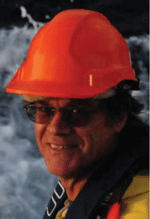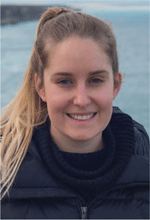The Great Australian Bight Right Whale Study, 1991–2018: bridging the gap between science and industry to provide baseline data for impact assessment in oil and gas
Claire Charlton A B , Robert D. McCauley A and Rhianne Ward AA Centre for Marine Science and Technology, Curtin University, Perth, WA 6102, Australia.
B Corresponding author. Email: claire.charlton@live.com.au
The APPEA Journal 59(2) 534-538 https://doi.org/10.1071/AJ18179
Accepted: 24 March 2019 Published: 17 June 2019
Abstract
The Curtin University Great Australian Bight Right Whale Study (GABRWS) delivers cost effective scientific research to inform risk-based decision making and conservation management of Environment Protection and Biodiversity Conservation Act 1999 (EPBC Act) listed endangered southern right whales (Eubalaena australis). The GABRWS has operated annually on Yalata Aboriginal lands at the Head of Bight in Australia’s largest calving ground, between 1991 and 2019, and at Fowlers Bay in the Nuyts Archipelago Marine Park between 2013 and 2019. The Offshore Petroleum and Greenhouse Gas Storage (Environment) Regulations 2009 require operators to demonstrate an understanding of values and sensitivities (particularly EPBC-listed threatened species and Matters of National Environmental Significance) in the environment and show that impacts and risks from proposed activities are as low as reasonably practicable and of an acceptable level. The GABRWS delivers peer reviewed science on southern right whale recovery and population trends critical for stock and impact assessment. The study promotes collaboration between the scientific institutions, the community, oil and gas (O&G) operators, stakeholders, government and regulators. Data are publicly available through published scientific literature and communicated through university and sponsor reports, sponsor presentations, community events and international conferences. The GABRWS provides a unique win-win example of a university program bridging the gap between science and industry to promote species conservation management and provide cost effective baseline scientific data for impact assessment in O&G. Benefits to sponsors also include collaboration with research, community and government organisations; access to scientific data in real time; and promotion of community stewardship and reputation.
Keywords: Commonwealth Marine Reserve, conservation, long-term monitoring program, management, marine mammal research, risk-based decision making, South Australia, stakeholder management, upstream oil and gas.

Claire Charlton is Research Associate with the Curtin University Centre for Marine Science and Technology, Western Australia and has a PhD in Marine Mammal Science. Fields of research include population demographics, underwater acoustics, fine scale behaviour and health assessments. Claire runs the long-term SRW population monitoring study in the Great Australian Bight, South Australia. She also works as a senior environmental advisor for Green Light Environmental in the resource industry. Her O&G experience includes environmental approvals and impact assessments, project management, stakeholder engagement, client liaison, oil spill preparedness and contingency planning, corporate affairs, compliance, mine site rehabilitation and management of offshore environmental surveys. Claire is driven to bridge the gap between science and industry and build efficiencies for improved environmental management. |

Associate Professor Robert McCauley began his science career in 1987 working in the area of underwater acoustics, receiving his PhD in 2001 from James Cook University. Rob has been working at Curtin University since 1996 developing hardware, techniques and analytical approaches for passive acoustic monitoring and understanding impacts of man-made sound on marine fauna. He has researched impacts of seismic survey air gun sources on animals from plankton to whales. |

Rhianne Ward is a PhD Candidate with the Curtin University Centre for Marine Science and Technology in Western Australia, researching baleen whale vocalisations, distribution and seasonal presence in southern Australian waters. As a research scientist Rhianne has completed studies in underwater acoustics, population biology and photo-identification, with experience in vessel, aerial and land based surveys. Rhianne has worked as a research assistant on the southern right whale population monitoring study in the Great Australian Bight for 5+ years. |
References
Burnell, S. B., and Bryden, M. M. (1997). Coastal residence periods and reproductive timing in southern right whales, Eubalaena australis. Journal of Zoology (London, England) 241, 613–621.| Coastal residence periods and reproductive timing in southern right whales, Eubalaena australis.Crossref | GoogleScholarGoogle Scholar |
Charlton, C. M. (2017). Population demographics of southern right whales (Eubalaena australis) in Southern Australia. Doctorate of Philosophy Thesis. Dissertation, Curtin University, Centre for Marine Science and Technology.
Charlton, C., Ward, R., McCauley, R. D., Brownell Jr, R. L., Salgado Kent, C., and Burnell, S. (2019a). Southern right whale (Eubalaena australis), seasonal abundance and distribution at Head of Bight, South Australia. Aquatic Conservation: Marine and Freshwater Ecosystems 29, 576–588.
| Southern right whale (Eubalaena australis), seasonal abundance and distribution at Head of Bight, South Australia.Crossref | GoogleScholarGoogle Scholar |
Charlton, C., Ward, R., McCauley, R. D., Brownell Jr, R. L., Guggenheimer, S., Salgado Kent, C. P., and Bannister, J. L. (2019b). Southern right whales (Eubalaena australis) return to a former wintering calving ground: Fowlers Bay South Australia. Marine Mammal Science. , .
| Southern right whales (Eubalaena australis) return to a former wintering calving ground: Fowlers Bay South Australia.Crossref | GoogleScholarGoogle Scholar |
Dawbin, W. H. (1986). Right whales caught in waters around south-eastern Australia and New Zealand during the nineteenth and early twentieth centuries. International Whaling Commission document (Special Issue) 10: 261–267.
Department of Sustainability Environment, Water, Population and Communities (DSEWPaC) (2012). Conservation Management Plan for the Southern Right Whale: A Recovery Plan under the Environment Protection and Biodiversity Conservation Act 1999 (2011–2021). Available at http://www.environment.gov.au/system/files/resources/4b8c7f35-e132-401c-85be6a34c61471dc/files/eaustralis-2011-2021.pdf
International Whaling Commission (IWC). (2013). Report of the workshop on southern right whales. International Whaling Commission document SC/65A/Rep05.
Tormosov, D. D., Mikhalev, Y. A., Best, P. B., Zemsky, V. A., Sekiguchi, K., and Brownell, R. L. (1998). Soviet catches of southern right whales, Eubalaena australis, 1951–1971; biological data and conservation implications. Biological Conservation 86, 185–197.
| Soviet catches of southern right whales, Eubalaena australis, 1951–1971; biological data and conservation implications.Crossref | GoogleScholarGoogle Scholar |
Ward, R., McCauley, R. D., Gavrilov, A. N., and Charlton, C. M. (2019). Underwater sound sources and ambient noise in Fowlers Bay, South Australia, during the austral winter. Acoustics Australia. , .
| Underwater sound sources and ambient noise in Fowlers Bay, South Australia, during the austral winter.Crossref | GoogleScholarGoogle Scholar |


